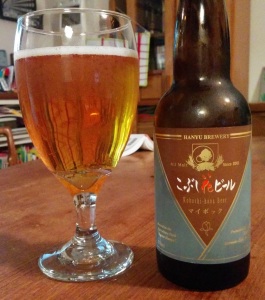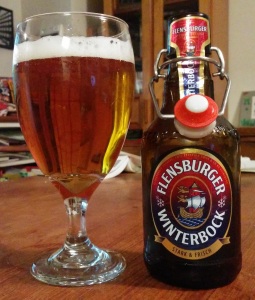We’re a bit early but today we’re looking at a couple of Maibock/Helles Bock beers. Locally we have the Kobushi-hana Maibock and for comparison we have the Flensburger Winterbock.
Kobushi-hana Maibock (こぶし花ビール・マイボック)

Vitals:
ABV: 7.0%
Availability: Year-round
Package: 330mL bottle
Misc: IBU – 25
Review:
Pour – Clean and clear pour, some carbonation, gold in color
Aroma – Lots of malt and earthy hops, very clean
Flavor – Sweet malts at first with some breadiness, then can taste the hop bitterness, very candy and honey sweet finish that’s too much
The Maibock beer style, as you might expect, is a beer for May. What this means specifically is that it’s the last of the stronger winter bock beers, and in order to ease the transition to the lighter summer beers the Maibock has the strength associated with all bock beers but is very pale in color, whereas many bock beers are darker in color. In fact, the Maibock is also referred to as the Helles Bock, which just means “light bock”. The paler color will also correspond to less caramel, and a bit more hops might be detectable then you might see with most bock beers.
Our first Maibock/Helles Bock review here then will be of the Kobushi-hana take on the Maibock. We tried their Belgian White recently and it was pretty decent, and the Maibock is another beer in their regular lineup, so let’s see how it holds up.
The Kobushi-hana Maibock is ultimately too sweet to be an enjoyable beer. Without the sweetness, it does OK, with some malts and earthy hops, and we can see how the hop bitterness is definitely present in the Maibock. Really, though, the sugars just overwhelm it. A fairly poor effort, and not something I’ll be trying again.
Flensburger Brauerei Winterbock

Vitals:
ABV: 7.0%
Availability: Winter
Package: 330mL bottle
Review:
Pour – Clear, fair amount of foam but settles quickly, amber gold
Aroma – Malts, a bit of sugar, dirty hops
Flavor – Bready, earth and malts and spice on the finish, a bit like peppermint
Flensburger Brauerei, which is located in the northern part of Germany bordering on Denmark, was founded in 1888 but still operates as an independent, mostly family-owned brewery. As with many traditional brewers, they pride themselves on following the German Beer Purity Law, which requires them to only use water, barley, and hops as ingredients.
Interestingly, Japan also has similar regulations – to be labeled and sold as beer in Japan, it can basically only contain those same basic beer ingredients, and in general the use of adjuncts requires the beer to be labeled as happoshu (発泡酒). The rule technically states that 2/3 of the grain bill must be malts, and the kinds of adjuncts they are allowed to use are limited. Of course, the power of the lobby is strong, and the macros have managed to get certain adjuncts they use heavily in the acceptable list, and the Asahi Super Dry I had just now listed rice and corn starch as part of the ingredient list. That means that interesting beers with interesting ingredients, like the North Island and Mikkeller Haskap Blonde collaboration (with haskap, of course), must be labeled as happoshu but corn starch beer is, well, beer.
The other point of pride for Flensburger is that they have stuck to the swing-top/flip-top bottle while the rest of the money-grubbing world has moved on to those crown caps. In fact, they claim to be one of the most successful breweries “in the swing-top segment”, so regardless of whether it has any effect on the beer or not, whatever they’re doing is certainly working, if topping the swing-top charts are your goal.
In any case, let’s move on to the beer! The Flensburger Winterbock is not the most exciting beer in the world, but serviceable. The hops and malts are actually in pretty good balance, and the spice on the finish is OK, if somewhat herbal medicine-like, which is kind of strange. Overall it doesn’t really burst with flavor, and while this beer could be much improved it’s relatively inoffensive.
If that doesn’t sound like high praise, well, it’s not high praise. The Flensburger Winterbock is a pretty mediocre beer, but still fares better than the Kobushi-hana Maibock. Actually, the Kobushi-hana has stronger flavors, which overall would be a plus except that the sweetness is of an unpleasant kind and is very dominant.
Basically, there are no winners here, and I wouldn’t recommend either of these. If you are interested in trying these beers out for some reason, the Kobushi-hana was purchased at Liquors Hasegawa and the Flensburger Maibock was acquired at Tokyo Liquor Land.
Fortunately, Maibock season is coming up, so we’ll have better examples to try in not too long.